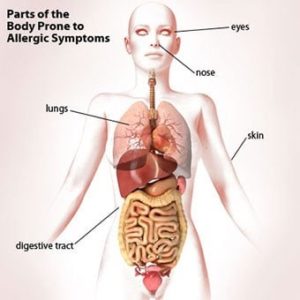Some pandemonic and frightening screams from the boys ‘room jerked me off the bed early on this particular Saturday morning. Daddy, Daddy! come and see his mouth! My 17-year-old son, hands cladding the mouth, was guided by his siblings to my room. Sighting the mouth, with lips and tongue more than double the normal size, got me shocked and almost perplexed. What’s is this? What’s the problem, I asked? I don’t know he said. Do you feel any pain and or itching in that mouth, I asked again? No, only heaviness, he said. Then i called my doctor to brief him about the development. Your son has ALLERGY, the doctor said and instructed me to bring him quickly to the hospital.
The Doctor told me my son’s case is a mild allergy. He narrated how he almost lost a patient of his to a severe allergic reaction when he treated a particular patient with sulphur- based medication. Just one shot of the drug, according to him, turned things upside down. The sulphur-allegic patient developed what he called anaphylaxis allergy, with blisters all over the body and breathing difficulty that warranted the doctor to put the patient on admission.
As for my son, just one dose of a particular medication, that I later know to be epinephrine brought the mouth, lips and tongue to normal, after few hours.
Allergy
Allergies occur when body’s immune system perceive and react to harmless foreign substance as being harmful or dangerous. An allergy starts when your immune system mistakes a normally harmless substance for a dangerous invader. The immune system then produces antibodies that remain on the alert for that particular invader (allergen). So that when you’re exposed to the allergen again, these antibodies can release a number of immune system chemicals – histamines, that cause allergy symptoms.
According to the experts, the immune system produced antibodies don’t go into “war” with allergens at the first exposure. But subsequent exposure to the wrongly perceived enemy triggers the antibodies to a fight that can inflame the skin, sinuses, airways, digestive system and others- The allergies
The severity of allergies varies from person to person and can range from minor irritation to anaphylaxis — a potentially life-threatening emergency. While most allergies can’t be cured, treatments can help relieve allergy symptoms.
Prevalence & Incidence
Closely associated with allergy is asthma, particularly in children. Plos One Journal 2019 reported asthma and allergic rhinitis as important cause of morbidity and mortality worldwide. In a cross-sectional population survey conducted between June 2017 and March 2018 across five cities representing five geo-political zones in Nigeria, the researchers affirmed that the prevalence of asthma and allergic rhinitis in Nigeria is high with variabilities across regions and age groups. According to the report, the number of persons with clinical asthma in Nigeria (approximately 13 million) is likely to rank among the highest in Africa.
Another study published in the Nigerian Journal of Clinical Practice claimed the prevalence of allergic diseases in childhood has increased considerably worldwide. Adding that a sizeable proportion of the children with allergies develop asthma in the course of their lives. The report noted that Atopic diseases, including atopic dermatitis, allergic rhinitis, and asthma, affect approximately 20% of the global population.
Children who have allergic asthma bear the double burden of the effects of the allergies and that of asthma. And this constitutes a significant burden to the child, parents, and society.
Food allergy is sometimes confused with food intolerance, but it’s more grievous with ill- health consequences. A study titled Food allergy and its clinical symptoms in Nigeria, by Simeon C. Achinewu, Department of Food Science and Technology, Rivers State University of Science and Technology, Port Harcourt, Nigeria noted that adverse effects resulting from ingestion of certain foods, are allergic symptoms resulting from hypersensitivity immunological reaction to certain food components. According to the study, a wide range of illness, including psychiatric symptoms, bed-wetting, abnormalities in the heart rate, has been attributed to food allergy.
Other facts about allergy from Medicinenet, include:
– 10%-30% of individuals in the industrialized world are affected by allergic conditions.
-Allergic rhinitis (nasal allergies) affects roughly 20% of Americans.
– Between prescription costs, physician visits, and missed days of work/school, the economic burden of allergic disease exceeds $3 billion annually.
–Asthma affects roughly 8%-10% of Americans. The estimated health costs for asthma exceed approximately $20 billion annually.
–Food allergies affect roughly 3%-6% of children in the United States, and about 1%-2% of adults in the U.S.
-The prevalence of allergic conditions has increased significantly over the last two decades and continues to rise.

Source: Bigstock
Symptoms
Allergy symptoms is dependent on the substance involved. It can affect airways, sinuses and nasal passages, skin, and digestive system.
Hay fever, also called allergic rhinitis can cause: Sneezing; Itching of the nose, eyes or roof of the mouth; Runny, stuffy nose; Watery, red or swollen eyes (conjunctivitis)
Food & Medication Allergy:
Experts say foods and medications can cause severe allergic reactions. These reactions, they say, often start with localized tingling or itching and then may lead to a rash or additional symptoms, such as swelling, nausea, vomiting, diarrhea, or difficulty breathing. Here are the two most common allergens that are ingested:
Foods Allergens: Cow’s milk, eggs, peanuts, tree nuts, wheat, soy, shellfish, finned fish, and sesame. Cow’s milk, egg, wheat, and soy allergies are most common in children and are often outgrown over time. The most common allergens in adults are peanut, tree nuts, and shellfish.
Medications Allergens: Antibiotics and anti-inflammatory agents, such as aspirin and ibuprofen.

A woman reads a food label at the supermarket. Source: Getty Images/Hemera
Insect sting allergy causes: A large area of swelling (edema) at the sting site; Itching or hives all over the body; Cough, chest tightness, wheezing or shortness of breath; Anaphylaxis
Atopic dermatitis, an allergic skin condition also called eczema, causing skin to: Itch; Redden; Flake or peel
Anaphylaxis are allergies that can trigger severe life-threatening reactions. Signs and symptoms of anaphylaxis include: Loss of consciousness; drop in blood pressure; severe shortness of breath; Skin rash; Light-headedness; rapid weak pulse; Nausea and vomiting. These allergies require medical emergency
Causes
Allergy starts when the body immune system mistakes a normally harmless substance for a dangerous invader and produces antibodies that remain on the alert to fight that particular substance (allergen) by releasing a number of immune system chemicals – histamine, that cause allergy symptoms.
Common allergy triggers (Allergens) include:
AIRBONE: Pollen, animal dander, dust mites and mold
FOOD: Peanuts, tree nuts, wheat, soy, fish, shellfish, eggs and milk
INSECT STING: Bee or wasp
MEDICATION: Antibiotics
LATEX: Condoms & diaphragms, gloves, balloons, rubber bands, toys and paints
Risk factors
Medical reports say allergies can develop at any age, but most food allergies, they say, begin at a young age, and many are outgrown. Environmental allergies too can develop at any time. The initial exposure or sensitization period may even begin before birth.
-Family history, or genetics, plays a large role, with a higher risk for allergies if parents or siblings have allergies.
– Children born via Cesarean section have a higher risk of allergy as compared to children who are delivered vaginally.
-Exposure to tobacco smoke and air pollution increases the risk of allergy.
-Boys are more likely to be allergic than girls.
– Timing of exposures to antigens,
-use of antibiotics.
Prevention
Avoid known triggers. Even if you’re treating your allergy symptoms, try to avoid triggers. If, for instance, you’re allergic to pollen, stay inside with windows and doors closed when pollen is high. If you’re allergic to dust mites, dust and vacuum and wash bedding often.
Keep a diary. When trying to identify what causes or worsens your allergic symptoms, track your activities and what you eat, when symptoms occur and what seems to help. This may help you and your doctor identify triggers
Take your medicine as prescribed
Shut out Breezes
Keep High Personal Hygiene
Wear a mask to avoid allergy triggers
Eat Healthy
Take more drinks ( non-alcoholic)
Inhale steam
Avoid smokes.
Publisher’s Note:
- Leave your comments in the comments box below and share the post
- Send your health related articles, stories, tips to compack2006@yahoo.co.uk for free publication.
- Like and Share our: Facebook: @citizencomfortng Twitter: @citizenconfort



On any hospital card I have, is usually boldly written allegic to SULPHAMIDES! When asking Pharmacy for malaria drugs, I tell them, No Sulphur.